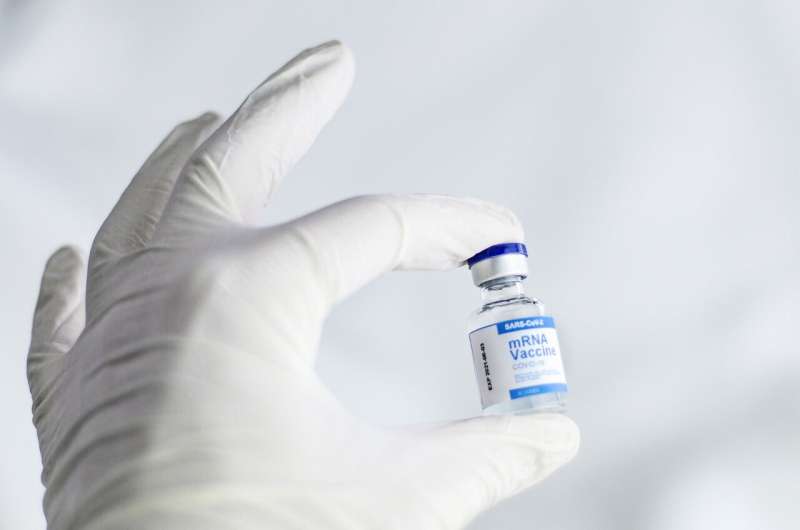
Vaccines that protect against severe illness, death and lingering long COVID symptoms from a coronavirus infection were linked to small increases in neurological, blood, and heart-related conditions in the largest global vaccine safety study to date.
The rare events—identified early in the pandemic—included a higher risk of heart-related inflammation from mRNA shots made by Pfizer Inc., BioNTech SE, and Moderna Inc., and an increased risk of a type of blood clot in the brain after immunization with viral-vector vaccines such as the one developed by the University of Oxford and made by AstraZeneca Plc.
The viral-vector jabs were also tied to an increased risk of Guillain-Barre syndrome, a neurological disorder in which the immune system mistakenly attacks the peripheral nervous system.
More than 13.5 billion doses of COVID vaccines have been administered globally over the past three years, saving over 1 million lives in Europe alone. Still, a small proportion of people immunized were injured by the shots, stoking debate about their benefits versus harms.
The new research, by the Global Vaccine Data Network, was published in the journal Vaccine, with the data made available via interactive dashboards to show methodology and specific findings.
The research looked for 13 medical conditions that the group considered “adverse events of special interest” among 99 million vaccinated individuals in eight countries, aiming to identify higher-than-expected cases after a COVID shot. The use of aggregated data increased the possibility of identifying rare safety signals that might have been missed when looking only at smaller populations.
Myocarditis, or inflammation of the heart muscle, was consistently identified following a first, second and third dose of mRNA vaccines, the study found. The highest increase in the observed-to-expected ratio was seen after a second jab with the Moderna shot. A first and fourth dose of the same vaccine was also tied to an increase in pericarditis, or inflammation of the thin sac covering the heart.
Safety signals
Researchers found a statistically significant increase in cases of Guillain-Barre syndrome within 42 days of an initial Oxford-developed ChAdOx1 or “Vaxzevria” shot that wasn’t observed with mRNA vaccines. Based on the background incidence of the condition, 66 cases were expected—but 190 events were observed.
ChAdOx1 was linked to a threefold increase in cerebral venous sinus thrombosis, a type of blood clot in the brain, identified in 69 events, compared with an expected 21. The small risk led to the vaccine’s withdrawal or restriction in Denmark and multiple other countries. Myocarditis was also linked to a third dose of ChAdOx1 in some, but not all, populations studied.
Possible safety signals for transverse myelitis—spinal cord inflammation—after viral-vector vaccines were identified in the study. So was acute disseminated encephalomyelitis—inflammation and swelling in the brain and spinal cord—after both viral-vector and mRNA vaccines.
Seven cases of acute disseminated encephalomyelitis after vaccination with the Pfizer-BioNTech vaccine were observed, versus an expectation of two.
The adverse events of special interest were selected based on pre-established associations with immunization, what was already known about immune-related conditions and pre-clinical research. The study didn’t monitor for postural orthostatic tachycardia syndrome, or POTS, that some research has linked with COVID vaccines.
Exercise intolerance, excessive fatigue, numbness and “brain fog” were among common symptoms identified in more than 240 adults experiencing chronic post-vaccination syndrome in a separate study conducted by the Yale School of Medicine. The cause of the syndrome isn’t yet known, and it has no diagnostic tests or proven remedies.
The Yale research aims to understand the condition to relieve the suffering of those affected and improve the safety of vaccines, said Harlan Krumholz, a principal investigator of the study, and director of the Yale New Haven Hospital Center for Outcomes Research and Evaluation.
“Both things can be true,” Krumholz said in an interview. “They can save millions of lives, and there can be a small number of people who’ve been adversely affected.”

Check out our mRNA service to expedite your vaccine research
PackGene Biotech is a world-leading CRO and CDMO, excelling in AAV vectors, mRNA, plasmid DNA, and lentiviral vector solutions. Our comprehensive offerings span from vector design and construction to AAV, lentivirus, and mRNA services. With a sharp focus on early-stage drug discovery, preclinical development, and cell and gene therapy trials, we deliver cost-effective, dependable, and scalable production solutions. Leveraging our groundbreaking π-alpha 293 AAV high-yield platform, we amplify AAV production by up to 10-fold, yielding up to 1e+17vg per batch to meet diverse commercial and clinical project needs. Moreover, our tailored mRNA and LNP products and services cater to every stage of drug and vaccine development, from research to GMP production, providing a seamless, end-to-end solution.
Related News
[2024/11/22] Gene and Cell Therapy- weekly digest from PackGene
FeaturedNewsArticlesPackGene's NewsletterReceive the latest news and insights to your inbox.About PackGenePackGene Biotech is a world-leading CRO and CDMO, excelling in AAV vectors, mRNA, plasmid DNA, and lentiviral vector solutions. Our comprehensive offerings span...
Novartis seeks more bolt-on deals as it purchases neuro startup for up to $1.1B
Novartis is buying gene therapy and neuroscience biotech Kate Therapeutics in a deal worth $1.1 billion in upfront and milestone payments, the Swiss pharma confirmed to Endpoints News on Thursday. And Novartis is not done yet. It is still on the lookout for bolt-on...
Genprex Signs Exclusive License to Additional Gene Therapy Technologies with the University of Michigan for the Treatment of Lung Cancer
License includes Genprex's Reqorsa® Gene Therapy in Combination with ALK-Inhibitors for the Potential Treatment of ALK-Positive Lung Cancer AUSTIN, Texas, Nov. 20, 2024 /PRNewswire/ -- Genprex, Inc. ("Genprex" or the "Company") (NASDAQ: GNPX), a clinical-stage...
Vyriad announces strategic collaboration with Novartis to develop in vivo CAR-T cell therapies
Collaboration will combine Vyriad's lentiviral vector platform and Novartis expertise and leadership in cell therapy innovation ROCHESTER, Minn., Nov. 20, 2024 /PRNewswire/ -- Vyriad, Inc., a clinical-stage biotechnology company developing the next generation of...
Related Services

